人教版初中九年级英语Unit 4 知识重难点
九年级英语人教版unit4知识点

九年级英语人教版unit4知识点Unit 4 Knowledge Points in Grade Nine English of People's Education PressIntroduction:In the Grade Nine English textbook of People's Education Press, Unit 4 covers various knowledge points that are essential for students to improve their English skills. This article will explore and discuss these knowledge points in depth, allowing students to have a clearer understanding of the unit and enhance their language proficiency.1. Vocabulary:Vocabulary plays a crucial role in language learning, enabling students to express themselves accurately and fluently. In Unit 4, students will come across a wide range of vocabulary related to different topics, such as travel, sports, hobbies, and emotions. It is essential for students to familiarize themselves with these words, understand their meanings, and learn how to use them appropriately in various contexts.2. Phrases and Idioms:Besides vocabulary, the unit also introduces various phrases and idioms that can enrich students' language and make their speech more native-like. For example, expressions like "go for a walk," "hit the gym," or "break a leg" are commonly used in English and can add color to students' conversations. By incorporating these phrases and idioms into their language practice, students can enhance their speaking and writing skills effectively.3. Grammar:Grammar forms the backbone of any language, providing the structure and rules necessary for effective communication. In Unit 4, students will review and learn several grammar concepts, including verb tenses, modal verbs, and conditionals. Understanding these grammar rules is essential for constructing accurate sentences and conveying the intended meaning. Through consistent practice and application, students can master these grammar points and improve their overall language proficiency.4. Reading Comprehension:Unit 4 includes various reading passages that aim to improve students' reading comprehension skills. These passages cover a range of topics, from environmental issues to personal experiences, allowing students to expand their knowledge while developing their readingabilities. By reading extensively and actively engaging with the texts, students can improve their comprehension, vocabulary, and critical thinking skills simultaneously.5. Listening Skills:Effective listening is a fundamental skill in language learning. Unit 4 provides numerous listening exercises that enable students to sharpen their listening skills and enhance their ability to understand spoken English. These exercises may feature dialogues, interviews, or monologues, covering different accents, speeds, and levels of complexity. Through regular practice, students can gradually improve their listening comprehension and become more proficient in understanding spoken English.6. Writing Practice:In Unit 4, students have the opportunity to practice various types of writing, such as descriptive, narrative, and persuasive writing. These writing tasks encourage students to express their ideas, thoughts, and experiences in a coherent and organized manner. By paying attention to the appropriate use of vocabulary, grammar, and sentence structure, students can develop their writing skills, foster creativity, and effectively communicate their thoughts on paper.Conclusion:Unit 4 of Grade Nine English in the People's Education Press textbook covers vital knowledge points necessary for students to enhance their language skills. By thoroughly understanding and practicing vocabulary, phrases, grammar, reading comprehension, listening, and writing, students can become more confident and proficient users of the English language. Regular and consistent practice, both in and outside the classroom, is key to achieving fluency and success in English communication.。
Unit4Iusedtobeafraidofthedark.重点知识点提升训练人教版九年级英语
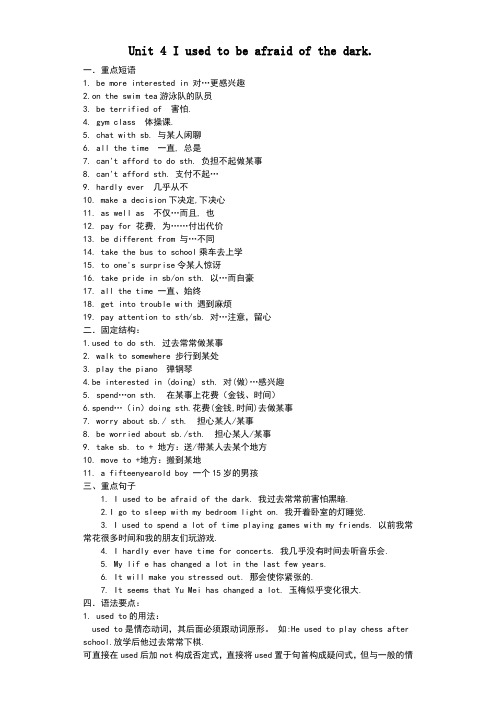
Unit 4 I used to be afraid of the dark.一.重点短语1. be more interested in 对…更感兴趣2.on the swim tea游泳队的队员3. be terrified of 害怕.4. gym class 体操课.5. chat with sb. 与某人闲聊6. all the time 一直, 总是7. can't afford to do sth. 负担不起做某事8. can't afford sth. 支付不起…9. hardly ever 几乎从不10. make a decision下决定,下决心11. as well as 不仅…而且, 也12. pay for 花费, 为……付出代价13. be different from 与…不同14. take the bus to school乘车去上学15. to one's surprise令某人惊讶16. take pride in sb/on sth. 以…而自豪17. all the time 一直、始终18. get into trouble with 遇到麻烦19. pay attention to sth/sb. 对…注意,留心二.固定结构:ed to do sth. 过去常常做某事2. walk to somewhere 步行到某处3. play the piano 弹钢琴4.be interested in (doing) sth. 对(做)…感兴趣5. spend…on sth. 在某事上花费(金钱、时间)6.spend…(in)doing sth.花费(金钱,时间)去做某事7. worry about sb./ sth. 担心某人/某事8. be worried about sb./sth. 担心某人/某事9. take sb. to + 地方:送/带某人去某个地方10. move to +地方:搬到某地11. a fifteenyearold boy 一个15岁的男孩三、重点句子1. I used to be afraid of the dark. 我过去常常前害怕黑暗.2.I go to sleep with my bedroom light on. 我开着卧室的灯睡觉.3. I used to spend a lot of time playing games with my friends. 以前我常常花很多时间和我的朋友们玩游戏.4. I hardly ever have time for concerts. 我几乎没有时间去听音乐会.5. My lif e has changed a lot in the last few years.6. It will make you stressed out. 那会使你紧张的.7. It seems that Yu Mei has changed a lot. 玉梅似乎变化很大.四.语法要点:1. used to的用法:used to是情态动词,其后面必须跟动词原形。
人教版英语九年级Unit4单元知识点归纳
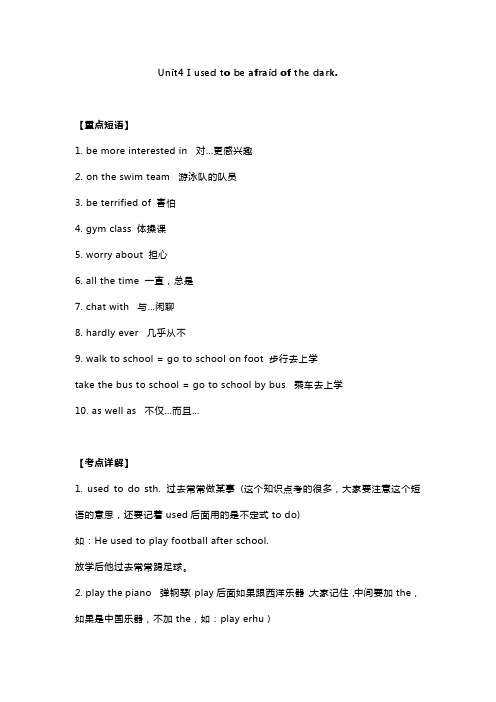
Unit4 I used to be afraid of the dark.【重点短语】1. be more interested in 对…更感兴趣2. on the swim team 游泳队的队员3. be terrified of 害怕4. gym class 体操课5. worry about 担心6. all the time 一直,总是7. chat with 与…闲聊8. hardly ever 几乎从不9. walk to school = go to school on foot 步行去上学take the bus to school = go to school by bus 乘车去上学10. as well as 不仅…而且...【考点详解】1. used to do sth. 过去常常做某事(这个知识点考的很多,大家要注意这个短语的意思,还要记着used后面用的是不定式to do)如:He used to play football after school.放学后他过去常常踢足球。
2. play the piano 弹钢琴(play后面如果跟西洋乐器,大家记住,中间要加the,如果是中国乐器,不加the,如:play erhu)3. ①be interested in sth. 对…感兴趣②be interested in doing sth. 对做…感兴趣(对于这两个用法大家一定要掌握,切记切记)如:He is interested in math, but he isn't interested in speaking English. 他对数学感兴趣,但是他对说英语不感兴趣。
4. interested adj. 感兴趣的,指人对某事物感兴趣,往往主语是人interesting adj.有趣的,指某事物/某人具有趣味,主语往往是物(对于interested 和interesting要区分清楚,一个主语往往是人,一个主语往往是物)5. be terrified of sth. 害怕……如:I am terrified of the dog.be terrified of doing sth. 害怕做……如:I am terrified of speaking.6. spend 动词,表示“花费金钱、时间”(spend和pay for它们的主语都是人,这一点大家要清楚)①spend…on sth. 在某事上花费(金钱、时间)(重要考点)②spend…(in)doing sth. 花费(金钱、时间)去做某事(重要考点,尤其要注意动名词,也就是动词的ing形式)如:He spends too much time on clothes. 他花费太多的时间在衣着上。
人教版九年级全一册英语Unit4单元语法知识点总结
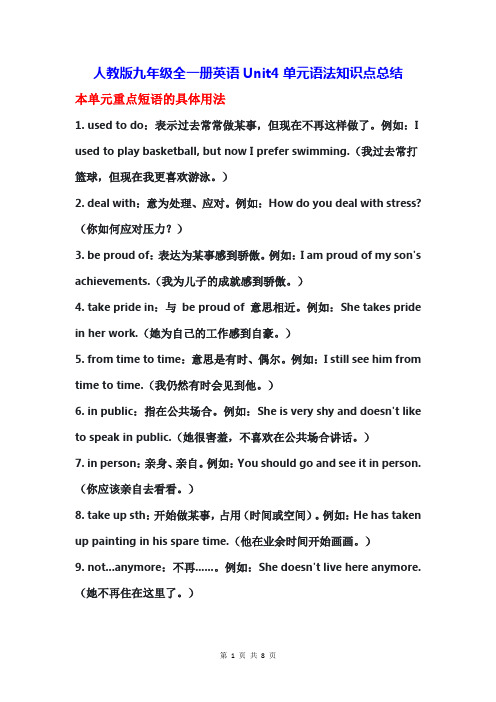
人教版九年级全一册英语Unit4单元语法知识点总结本单元重点短语的具体用法1. used to do:表示过去常常做某事,但现在不再这样做了。
例如:I used to play basketball, but now I prefer swimming.(我过去常打篮球,但现在我更喜欢游泳。
)2. deal with:意为处理、应对。
例如:How do you deal with stress?(你如何应对压力?)3. be proud of:表达为某事感到骄傲。
例如:I am proud of my son's achievements.(我为儿子的成就感到骄傲。
)4. take pride in:与be proud of 意思相近。
例如:She takes pride in her work.(她为自己的工作感到自豪。
)5. from time to time:意思是有时、偶尔。
例如:I still see him from time to time.(我仍然有时会见到他。
)6. in public:指在公共场合。
例如:She is very shy and doesn't like to speak in public.(她很害羞,不喜欢在公共场合讲话。
)7. in person:亲身、亲自。
例如:You should go and see it in person.(你应该亲自去看看。
)8. take up sth:开始做某事,占用(时间或空间)。
例如:He has taken up painting in his spare time.(他在业余时间开始画画。
)9. not...anymore:不再......。
例如:She doesn't live here anymore.(她不再住在这里了。
)10. worry about:担心、担忧。
例如:Don't worry about the exam, just do your best.(不要担心考试,尽力就好。
Unit4必背知识点 2021-2022学年人教版英语 九年级全册
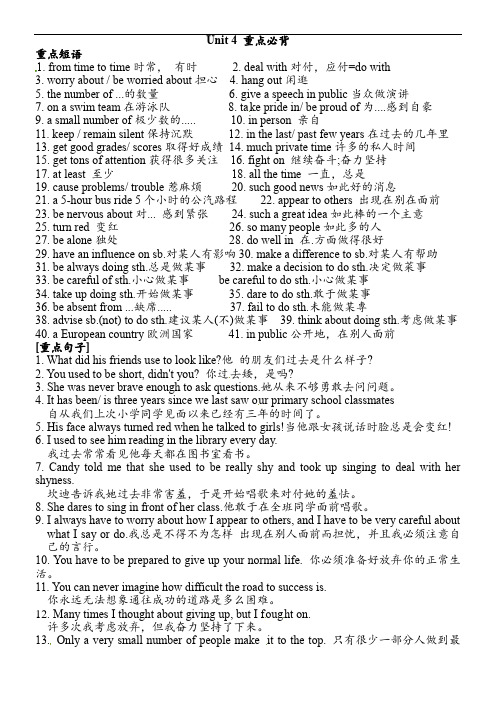
Unit 4 重点必背重点短语1. from time to time时常,有时2. deal with对付,应付=do with3. worry about / be worried about担心4. hang out闲逛5. the number of ...的数量6. give a speech in public当众做演讲7. on a swim team在游泳队8. take pride in/ be proud of为....感到自豪9. a small number of极少数的..... 10. in person 亲自11. keep / remain silent保持沉默12. in the last/ past few years在过去的几年里13. get good grades/ scores取得好成绩14. much private time许多的私人时间15. get tons of attention获得很多关注16. fight on 继续奋斗;奋力坚持17. at least 至少18. all the time 一直,总是19. cause problems/ trouble惹麻烦20. such good news如此好的消息21. a 5-hour bus ride 5个小时的公汽路程22. appear to others 出现在别在面前23. be nervous about对... 感到紧张24. such a great idea如此棒的一个主意25. turn red 变红26. so many people如此多的人27. be alone独处28. do well in 在.方面做得很好29. have an influence on sb.对某人有影响30. make a difference to sb.对某人有帮助31. be always doing sth.总是做某事32. make a decision to do sth.决定做菜事33. be careful of sth.小心做某事be careful to do sth.小心做某事34. take up doing sth.开始做某事35. dare to do sth.敢于做某事36. be absent from ...缺席..... 37. fail to do sth.未能做某專38. advise sb.(not) to do sth.建议某人(不)做某事39. think about doing sth.考虑做某事40. a European country欧洲国家41. in public公开地,在别人面前[重点句子]1. What did his friends use to look like?他的朋友们过去是什么样子?2. You used to be short, didn't you? 你过去矮,是吗?3. She was never brave enough to ask questions.她从来不够勇敢去问问题。
新人教版教材九年级英语第四单元全单元教案解析

新人教版教材九年级英语第四单元全单元教案解析Unit 4: I Used to Be Afraid of the Dark教材内容分析:本单元是初中英语材第三册第四单元。
本单元的核心话题为“talk about what they used to be like”,围绕着谈论过去自己和他人过去经常做的事,谈论自己和他人过去的外貌、性格和爱好。
通过观察图片、听力理解和阅读理解等训练方式,以及独立研究、合作交流和完成任务等形式完成目标语言的输入。
研究句型“used to”为主要研究任务,并且设置任务型综合性语言实践活动,让学生在交际活动中学会如何正确地用英语表达自己的意见和建议。
重点培养学生的得语言运用能力、实践能力、合作能力和创新意识。
总体教学目标:1.知识目标A。
研究并掌握下列重点词汇,如airplane。
terrify。
insect。
candy。
chew。
gum。
chat。
daily。
comic。
death。
afford。
cause。
patient。
n。
necessary。
exactly。
n。
waste。
in the end。
to one’s sur prise。
no longer。
take pride in。
give up。
pay n。
not…any more.B。
掌握一般过去时的用法及其与一般现在时的区别。
C。
理解并正确运用下列短语:used to do sth。
sleep with my bedroom light on。
no XXX.2.能力目标A。
能客观公正地审视过去,以使对将来做事进行正确定位。
B。
能根据本单元内容学会综合谈论人的变化。
3.情感文化目标A。
培养自己对已发生的事发表主观看法和客观分析的能力。
B。
认识到目前存在的不足,能正确地区别是与非,克服不足,以诚待人,健康向上。
教学重点和难点:A。
重点:used to句型B。
难点:used to句型在日常生活中的运用。
教学方法:视听法、问答法和情景交际法课时分配:本单元用七课时;第一课时―――n A 1a-2c,第二课时―――n A 3a-3b,第三课时―――n B 1a-2c。
初中英语 人教版 九年级全一册 Unit 4 知识点
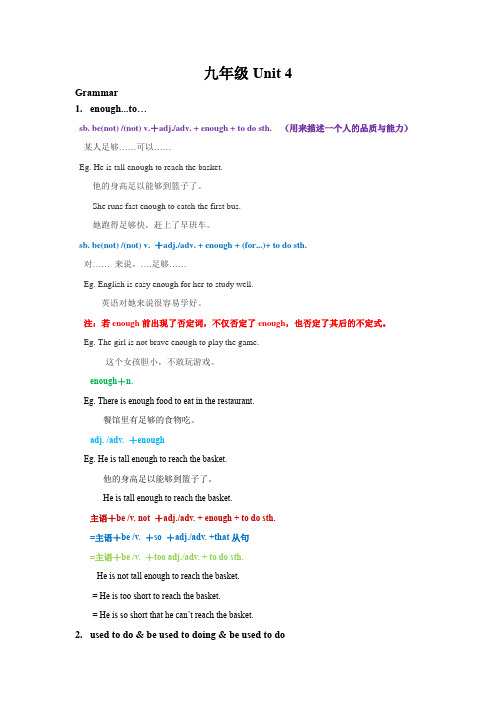
九年级Unit 4Grammar1.enough...to…sb. be(not) /(not) v.+adj./adv. + enough + to do sth. (用来描述一个人的品质与能力)某人足够……可以……Eg. He is tall enough to reach the basket.他的身高足以能够到篮子了。
She runs fast enough to catch the first bus.她跑得足够快,赶上了早班车。
sb. be(not) /(not) v. +adj./adv. + enough + (for...)+ to do sth.对…… 来说,….足够……Eg. English is easy enough for her to study well.英语对她来说很容易学好。
注:若enough前出现了否定词,不仅否定了enough,也否定了其后的不定式。
Eg. The girl is not brave enough to play the game.这个女孩胆小,不敢玩游戏。
enough+n.Eg. There is enough food to eat in the restaurant.餐馆里有足够的食物吃。
adj. /adv. +enoughEg. He is tall enough to reach the basket.他的身高足以能够到篮子了。
He is tall enough to reach the basket.主语+be /v. not +adj./adv.+ enough+ to do sth.=主语+be /v. +so +adj./adv.+that从句=主语+be /v. +too adj./adv.+ to do sth.He is not tall enough to reach the basket.= He is too short to reach the basket.= He is so short that he can’t reach the basket.ed to do & be used to doing & be used to doused to do sth. 过去常常做某事(现在不做了)主语适用于各种人称。
人教版英语九年级Unit 4《I used to be afraid of the dark》全单元

人教版英语九年级Unit 4《I used to be afrd of the dark》全单元教学设计一. 教材分析人教版英语九年级Unit 4的主题是“I used to be afrd of the dark”,主要讲述了人们过去和现在的变化。
本单元包括两个部分:Part A和Part B。
Part A包含一个听力任务、一个口语任务和三个阅读任务,而Part B包含一个口语任务、两个阅读任务和一个写作任务。
教材内容丰富,旨在提高学生听说读写四项基本技能,同时培养他们的文化意识和跨文化交流能力。
二. 学情分析九年级的学生已经具备了一定的英语基础,能够运用所学知识进行简单的交流。
但是,他们在词汇、语法和听力方面还存在一定的困难。
因此,在教学过程中,教师需要关注学生的个体差异,充分调动他们的学习积极性,激发他们的学习兴趣。
三. 教学目标1.知识目标:学生能够掌握本单元的重点词汇和语法知识,正确运用一般过去时描述过去和现在的变化。
2.能力目标:学生能够在不同情境下运用所学知识进行听说读写操作,提高他们的语言运用能力。
3.情感目标:学生能够了解并尊重文化差异,培养跨文化交流的能力。
四. 教学重难点1.重点:本单元的重点词汇和语法知识,以及一般过去时的运用。
2.难点:一般过去时的运用,以及如何在实际情境中进行跨文化交流。
五. 教学方法1.任务型教学法:通过完成各种任务,激发学生的学习兴趣,提高他们的实践能力。
2.情境教学法:创设真实的情境,帮助学生理解并运用所学知识。
3.交际法:鼓励学生积极参与课堂交流,提高他们的口头表达能力。
六. 教学准备1.教师准备:备好相关教学材料,如PPT、听力材料、阅读材料等。
2.学生准备:预习本单元内容,完成相关的自主学习任务。
七. 教学过程1.导入(5分钟)教师通过提问方式引导学生回顾上一单元学过的内容,激发学生的学习兴趣。
例如:“Do you remember what we learned in the last unit? How was your weekend?”2.呈现(10分钟)教师通过展示PPT或实物,呈现本节课的主题“I used to be afrd ofthe dark”,引导学生关注一般过去时的运用。
人教九年级英语unit4知识点

人教九年级英语unit4知识点Unit 4 Knowledge Points in Ninth Grade English TextbookAs ninth-grade students studying the English language, it is important for us to grasp the knowledge points within each unit. In this article, we will explore the key concepts and information covered in Unit 4 of our textbook. Let's dive in!1. Vocabulary Expansion:Unit 4 introduces us to a range of new vocabulary words, allowing us to expand our language skills. These words include "ambition," "athlete," "boundary," "duty," and "status." It is crucial to understand the meaning and usage of these words, as they will greatly enhance our comprehension and communication abilities.2. Grammar Excursion:One essential grammar concept covered in this unit is the past simple and past continuous tense. It is crucial to differentiate between the two and understand when to use each one. While the past simple tense refers to a completed action in the past, the past continuous tense emphasizes an ongoing action or an interrupted action in the past. Mastering this grammar point will provide us with the foundation toconstruct accurate and coherent sentences when discussing events or actions in the past.3. Reading Comprehension:Unit 4 revolves around the theme of ambition and success. Through various reading passages, we are exposed to inspiring stories of individuals who have overcome challenges to achieve their dreams. These passages not only improve our reading skills but also broaden our horizons by introducing us to different perspectives and experiences.4. Listening Practice:In Unit 4, we are given the opportunity to practice our listening skills through audio recordings. These recordings cover a range of topics related to ambition and success. By listening carefully and following the instructions, we can improve our ability to comprehend spoken English and sharpen our listening comprehension skills. Remember to take notes and pay attention to details while listening to the recordings.5. Writing Development:Unit 4 also encourages us to develop our writing skills. We are provided with writing tasks that allow us to express our ideas, opinions, and personal experiences. Through these activities, we can enhance our ability to communicate effectively in writing, employing proper grammatical structures and appropriate vocabulary.6. Cultural Insights:In addition to language skills, Unit 4 provides us with insights into different cultures. By exploring the stories and experiences of individuals from various backgrounds, we can develop a better understanding and appreciation for diversity. This cultural awareness not only broadens our knowledge but also promotes empathy and understanding towards others.7. Critical Thinking:Unit 4 challenges us to think critically and analyze the content we encounter. Through discussion questions and reflection activities, we are prompted to evaluate various aspects of ambition, success, and the pursuit of dreams. These exercises encourage us to develop our analytical skills and think beyond the surface level, fostering a deeper understanding of the topics covered.In conclusion, Unit 4 of our ninth-grade English textbook offers a wide range of knowledge points that are crucial to our language development. From vocabulary expansion to grammar exercises, reading comprehension to listening practice, writing development, cultural insights, and critical thinking, this unit provides a comprehensive learning experience. By dedicating ourselves to understanding and mastering these concepts, we can enhance our English language skills and cultivate a broader perspective on the world around us.。
人教版英语九年级Unit 4 重点知识归纳讲解

Unit 4 I used to be afraid of the dark. 知识清单Section A一、重要短语:1. 几天a couple of days2. 在课堂上保持沉默be silent in class3. 在游泳队on the swim team4. 过去很幽默used to be humorous5. 回答问题不够大胆be not brave enough to answer questions6. 对运动更感兴趣be more interested in sports7. 不时,有时from time to time8. 一些给年轻人的建议some advice to young people9. 在他考试中获得高分get good scores on his exam(s)10. 采访一个18岁的亚洲名星interview an 18-year-old Asian pop star11. 吸引无数目光get tons of attention12.有很多个人时间have much private time13. 我身边的警卫guards around me14. 放弃正常生活give up normal life15. 通向成功的路the road to success16. 害怕孤独be afraid of being alone17. 需要很多才能和艰苦的工作获得成功need a lot of talent and hard work to succeed18. 在大庭广众下演讲give a speech in public19. 读关于欧洲历史和非洲文化的书read books on European history and African culture20. 教我们英式英语teach us British English21. 到达成功的顶峰make it to the top二. 知识讲解Section A1. Mario used to be short. He used to wear glasses. 玛里奥过去个子矮。
人教版九年级英语上册课件:Unit 4 单元重难点题组小专题(共19张PPT)
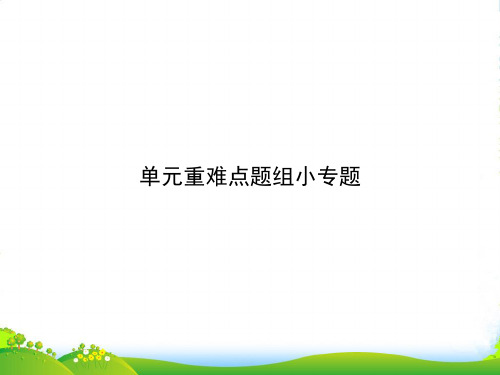
• 重难点一used to do与be used to doing 辨析
• Ⅰ.单项选择。
A
•(
)1.Our Chinese teacher can
speak some English.That’s because
he
some foreigners Chinese in
an international company.
to work,but
niosw uhseed to
taking a bus.
• 重难点二deal with的用法
• Ⅰ.单项选择。
• (cBan’t)1s.olv—e Wthee’vperobbeleemn .trying hard,but
• —I think you can way.
it in another
flood
large areas,but now the waters of it
are used to
energy.
• A.was used to;producing
• B.used to;producing
• C.was used to;produce
• D.used to;produce
• Ⅱ.按要求完成下列句子,每空一词。
•
A( to
)1.—More and more people visit Mount Huangshan.
come
• —That’s true.It has become the of Anhui.
• A.pride
• B.effort
• C.speech
• D.influence
• (A )2.Ma Long is good at table
人教版英语九年级全册Unit4 单元重难点归纳
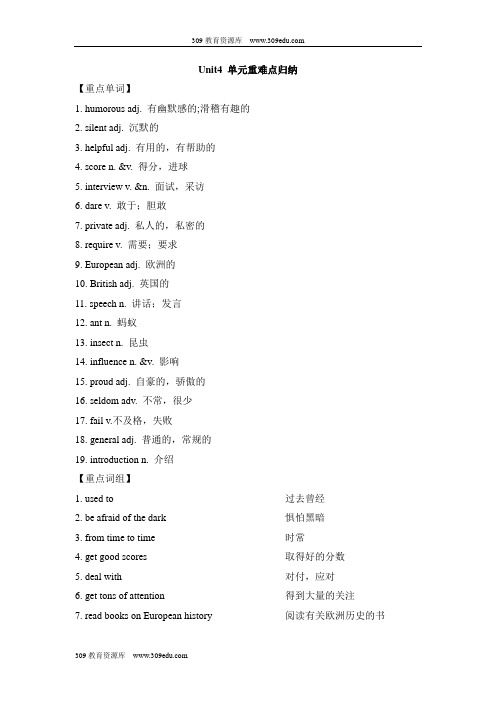
Unit4 单元重难点归纳【重点单词】1. humorous adj. 有幽默感的;滑稽有趣的2. silent adj. 沉默的3. helpful adj. 有用的,有帮助的4. score n. &v. 得分,进球5. interview v. &n. 面试,采访6. dare v. 敢于;胆敢7. private adj. 私人的,私密的8. require v. 需要;要求9. European adj. 欧洲的10. British adj. 英国的11. speech n. 讲话;发言12. ant n. 蚂蚁13. insect n. 昆虫14. influence n. &v. 影响15. proud adj. 自豪的,骄傲的16. seldom adv. 不常,很少17. fail v.不及格,失败18. general adj. 普通的,常规的19. introduction n. 介绍【重点词组】1. used to 过去曾经2. be afraid of the dark 惧怕黑暗3. from time to time 时常4. get good scores 取得好的分数5. deal with 对付,应对6. get tons of attention 得到大量的关注7. read books on European history 阅读有关欧洲历史的书8. African culture 非洲文化9. be alone 独处10. give a speech in public 作一个公开演讲11. paint pictures 画画12. be nervous about tests 对考试感到紧张13. influence his way of thinking 影响他的思维方式14. be proud of …/take pride in…为……感到骄傲15. be absent from classes 逃课16. fail the examinations 考试不及格17. make a decision 下决心18. talk with sb. in person 亲自找某人谈话19. to one’s surprise 使某人惊讶的是20. feel good about oneself 对自己充满信心21. a general self-introduction 一个简要的自我介绍22. in the last few years 在最近几年23. remain silent 保持沉默24. have a great influence on sb. 对某人有很大的影响【重点句式】1. —You used to be short, didn’t you? —Yes, I did.——你过去个子矮,是吗?——是的,我是。
人教版九年级英语Unit4重点知识归纳

Unit4 I used to be afraid of the dark重点知识归纳一、词汇应用1.be silent in class在课堂上保持沉默2.be interested in ... 对……感兴趣3.on a basketball team 在篮球队4.from time to time 时常;有时5.turn red 变红6.get good scores on the exams 在考试中取得好成绩7.wear glasses 戴眼镜8.take up singing 开始唱歌9.deal with her shyness 克服她的羞怯10.not ... anymore 不再……11.in front of crowds 在众人面前12.all the time 频繁;反复13.get tons of attention 被众人所关注;吸引无数目光14.worry about ... / be worried about ... 担心……;担忧……15.be careful about ... 对……小心16.give up your normal life 放弃你正常的生活17.the road to success 成功之路18.fight on 奋力坚持下去;继续战斗19.require a lot of talent and hard work 需要很大的天赋和勤奋20.make it to the top 成功21.give a speech 发表演讲22.in public 公开地;在别人面前23.be nervous about tests 考试紧张24.do well in school 在学校表现好25.cause problems 制造麻烦26.take care of sb. 照顾某人27.influence his schoolwork 影响他的学业28.be absent from classes 缺课;缺勤29.fail his examinations 他考试不及格30.in person 亲身;亲自31.even though 即使;虽然32.think of sb. 想起某人33.become active in many other activities在许多别的活动中变得积极34.send sb. to a boarding school 将某人送到一所寄宿学校35.dare to do sth. 敢做某事36.make the decision to do sth. 决定做某事37.advise sb. to do sth. 建议某人做某事二、重点句型1.I used to be afraid of the dark.我过去常常前害怕黑暗.2.I go to sleep with my bedroom light on.我开着卧室的灯睡觉.3.I used to spend a lot of time playing games with my friends.以前我常常花很多时间和我的朋友们玩游戏.4.I hardly ever have time for concerts.我几乎没有时间去听音乐会.5.My life has changed a lot in the last few years.我的生活在过去几年里改变了很多.6.It will make you stressed out.那会使你紧张的.7.It seems that Yu Mei has changed a lot.玉梅似乎变化很大.三、词汇讲解1. silentsilent是形容词,意为“沉默的;无言的”,其名词形式为silence。
[荐]人教版九年级英语上Unit4单词、知识梳理、词汇句式精讲
![[荐]人教版九年级英语上Unit4单词、知识梳理、词汇句式精讲](https://img.taocdn.com/s3/m/a68d8ae0a8956bec0875e312.png)
人教版九年级英语上Unit4单词、知识梳理、词汇句式精讲一、Unit4 单词humorous [ˈhjuːmərəs] 有幽默感的;滑稽有趣的silent [ˈsaɪlənt] 不说话的;沉默的helpful ['helpfəl] 有用的;有帮助的from time to time [frɒm//taɪm//tuː//taɪm] 时常;有时score [skɔː] 得分;打分background [ˈbækɡraʊnd] 背景interview [ˈɪntəvjuː] 采访;面试n.Asian [ˈeɪʃ(ə)nˌˈeɪʒ(ə)n] 亚洲的;亚洲人的,亚洲人deal with 对付;应付dare [deə] 敢于;胆敢private [ˈpraɪvɪt] 私人的;私密的guard [ɡɑːd] 警卫;看守v.守卫;保卫require [rɪˈkwaɪə] 需要;要求European [jʊərəˈpiːən] 欧洲的;欧洲人的British ['brɪtɪʃ] 英国的;英国人的speech [spiːtʃ] 讲话;发言ant [ænt] 蚂蚁insect [ˈɪnsekt] 昆虫influence [ˈɪnflʊəns] 影响seldom [ˈseldəm] 不常;很少proud [praʊd] 自豪的;骄傲的be proud of 为⋯⋯骄傲;感到自豪absent [ˈæbsənt] 缺席;不在fail [feɪl] 失败;未能(做到)examination [ɪgˌzæmɪ'neɪʃən] 考试;审查boarding school 寄宿学校in person 亲身;亲自exactly [ɪg'zæktli] 确切地;精确地pride [praɪd] 自豪;骄傲take pride in 为⋯⋯感到自豪grandson [ˈɡrændsʌn] 孙子;外孙general [ˈdʒenər(ə)l] 普遍的;常规的;总的将军introduction [ɪntrəˈdʌkʃ(ə)n] 介绍Paula 葆拉(女名)Alfred 艾尔弗雷德(男名)Billy 比利(男名)Candy 坎迪(女名)Jerry 杰里(男名);杰丽(女名)Emily 埃米莉(女名)二、Unit4 知识梳理Unit4 I used to be afraid of the dark.【重点短语】ed to do 过去常常做2.deal with 对付应付3.be proud of 为……骄傲,感到自豪4.take pride in 为……感到自豪5.from time to time 时常,有时6.in public 公开地7.in person 亲身,亲自8.take up sth 开始做,接受,占用9.not……anymore 不再10.worry about 为……担忧11.hang out 闲逛12.think about 考虑13.be alone 独处14.on the soccer team 在足球队15.no longer 不再16.make a decision 做决定17.to one’s surprise 令某人吃惊的是18.even though 尽管19.pay attention to 对……注意,留心20.in the last few years 在过去的几年里21.be afraid of 害怕22.turn red 变红23.tons of attention 很多关注24.be careful 当心25.give up 放弃26.a very small number of …极少数的……27.give a speech 作演讲28.all the time 一直总是29.be interested in 对……感兴趣30.change one’s life 改变某人的生活31.take care of 照顾32.one of…, ……之一【重点句型】1. I used to be afraid of the dark.我过去常常前害怕黑暗.2.I go to sleep with my bedroom light on.我开着卧室的灯睡觉.3. I used to spend a lot of time playing games with my friends.以前我常常花很多时间和我的朋友们玩游戏.4. I hardly ever have time for concerts.我几乎没有时间去听音乐会.5. My life has changed a lot in the last few years.我的生活在过去几年里改变了很多.6. It will make you stressed out.那会使你紧张的.7. It seems that Yu Mei has changed a lot.玉梅似乎变化很大.三、词汇精讲1. silentsilent是形容词,意为“沉默的;无言的”,其名词形式为silence。
人教版初中英语9年级Unit4知识清单+习题 (含解析)

九年UNIT 4 I used to be afraid of the dark.一、必会单词humorous adj有幽默感的:滑稽有趣的silent adj不说话的,沉默的helpful adj有用的,有帮助的score n&v得分:进球background n 背景interview v采访:面试n面试;访谈Asian adj亚洲(人)的n.亚洲人deal v ( dealt, dealt) 对付;对待shyness n害羞;腼腆dare v敢于;胆敢crowd n人群;观众ton n吨;(pl.)大量;许多private adj私人的,私密的guard n警卫;看守v.守卫;保卫require v需要;要求European adj欧洲(人)的n欧洲人African adj非洲(人)的n.非洲人British adj英国(人)的speech n讲话;发言public n民众adj公开的;公众的ant n蚂蚁insect n.昆虫seldom adv不常;很少influence v&n影响absent adj.缺席;不在fail v不及格;失败,未能(做到)examination n考试;审查exactly adv确切地,精确地pride n.自豪,骄傲proud adj自豪的:骄傲的general adj.总的,普遍的,常规的n.将军introduction n.介绍二、常考短语used to过去常常from time to time有时,不时take up开始做not.. . anymore不再worry about为…担忧hang out闲逛;闲荡think about考虑be alone独处in public公开地;在别人(尤指生人)面前be proud of…为…感到骄傲、自豪feel lonely感到孤独in person亲身;亲自make some good friends交一些好朋友take care of照看;照顾take pride in…为……感到自豪be afraid of害怕turn red变红deal with应对;处理tons of attention很多关注be careful当心give up放弃a very small number of…极少数的…give a speech作演讲all the time一直;总是do well in在…方面做得好make the decision做决定boarding school寄宿学校even though尽管think of关心,想着in the last few years在过去的几年里used to do sth.过去常常做某事have to do sth不得不做某事give up doing sth.放弃做某事adj.+ enough to do sth足够…而能够做某事be prepared to do sth.准备做某事take up doing sth.开始做某事require sb. to do sth要求某人做某事make a decision to do sth.决定做某事be always doing sth,总是做某事It has been+ー段时间+ since+从句自从…以来已经有多长时间了It’s+ adj +for sb.+ to do sth.对某人来说做某事是…be afraid of doing sth.害怕做某事make sb. do sth.让某人做某事try to do sth.尽力做某事see sb. doing sth看见某人在做某事begin to do sth.开始做某事decide to do sth决定做某事It’s hard to believe that..很难相信…dare to do sth.敢于做某事1. Mario, you used to be short, didn't you?2. Did Mario use to be short?3. It's been three years since we last saw our primary school classmates4. Only a very small number of people make it to the top.5. They take pride in everything good that I do6. I'm much happier now, and I work even harder than I used to7.It is hard to believe that he used to have difficulties in school8.It's very important for parents to be there for their children.四、重点语法: used to的用法1.---Mario,you used to be short,didn’t you? ---Yes,I did2. Paula used to be really quiet.3. She didn’t use to like tests.4. ---Did he use to wear glasses? ---Yes,he did./No, he didn’t.以上均为关于used to用法的句子。
人教版九年级英语Unit 4 I used to be afraid of the dark.教案
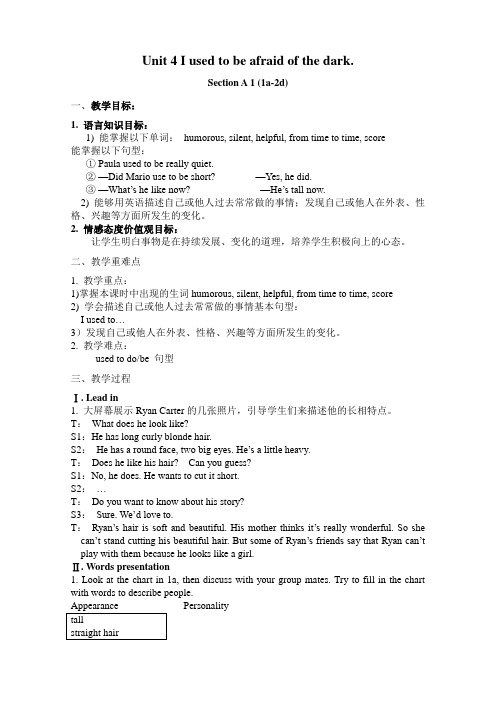
Unit 4 I used to be afraid of the dark.Section A 1 (1a-2d)一、教学目标:1. 语言知识目标:1) 能掌握以下单词:humorous, silent, helpful, from time to time, score能掌握以下句型:① Paula used to be really quiet.②—Did Mario use to be short? —Yes, he did.③—What’s h e like now? —He’s tall now.2) 能够用英语描述自己或他人过去常常做的事情;发现自己或他人在外表、性格、兴趣等方面所发生的变化。
2. 情感态度价值观目标:让学生明白事物是在持续发展、变化的道理,培养学生积极向上的心态。
二、教学重难点1. 教学重点:1)掌握本课时中出现的生词humorous, silent, helpful, from time to time, score2) 学会描述自己或他人过去常常做的事情基本句型:I use d to…3)发现自己或他人在外表、性格、兴趣等方面所发生的变化。
2. 教学难点:used to do/be 句型三、教学过程Ⅰ. Lead in1. 大屏幕展示Ryan Carter的几张照片,引导学生们来描述他的长相特点。
T:What does he look like?S1:He has long curly blonde hair.S2:He has a round face, two big eyes. He’s a little heavy.T:Does he like his hair? Can you guess?S1:No, he does. He wants to cut it short.S2:…T:Do you want to know about his story?S3:Sure. We’d love to.T:Ryan’s hair is soft and beautiful. His mother thinks it’s really wonderful. So she can’t stand cutting his beautiful hair. But some of Ryan’s friends say that Ryan can’t play with them because he looks like a girl.Ⅱ. Words presentation1. Look at the chart in 1a, then discuss with your group mates. Try to fill in the chart with words to describe people.Personality2. Let some Ss say their answers. Let other Ss add more.Appearance:tall, straight hair, short, of medium height, straight/curly hair, long/short hair, heavy, thin, of medium bu ilt …Personality:Outgoing, shy, funny, serious, cute, quiet, kind, brave, friendly, active 3. Lear the new words with the Ss:humorous, silent, helpful, from time to time, score Ⅲ. PresentationShow two different pictures of some famous people. Talk about their differences.1. Jiang Wen:Jiang Wen used to wear glasses, but he doesn’t wear glasses now.2. Zhang yishanZhang yishan used to be short, but he is tall now.T:Explain the use of “used to do/be …” to the Ss.Ⅳ. Listening1. T: Bob hasn’t seen some of his friends for four years. Now he’s seeing his friends.What did his friends use to like? Listen and fill in the blanks.1) Mario used to be ______. He used to wear _______.2) Amy used to be _____. She used to have _______ hair.3) Tina used to have ______ and ______ hair.Keys: short glassestall shortred curly2. Play the recording for the Ss to listen.3. Ss listen and try to fill in the blanks with the right words.4. Play the recording again. Let Ss check their answers.Ⅴ. Pair work1. Look at the picture in 1a and make conversations in pairs.2. Ss work in pairs to ask and answer the appearance about Mario, Amy and Tina.3. Let some pairs ask and answer in pairs.e.g. A: Did Mario use to be short?B: Yes, he did. He used to be really short.A: What’s he like now?B: He’s tall now.Ⅵ. ListeningWork on 2a:T: Paula has changed a lot in the past few years. Do you want to know what she used to be?1. Look at the words in 2a. Let some Ss read the words aloud. Make sure all the Sshumor (幽默) + ous →有幽默感的e.g. Cartoons are humorous pictures with words.漫画是附有文字的幽默图片。
人教版九年级英语unit4知识点

人教版九年级英语unit4知识点Unit 4: EarthquakesIntroduction:In the ninth grade English textbook of the People's Education Press, Unit 4 is dedicated to the topic of earthquakes. This important scientific phenomenon is explored in depth to enhance students' understanding of its causes, effects, and precautions. Through this unit, students will learn about the science behind earthquakes and the devastating consequences they can have on our planet.Section 1: What are Earthquakes?An earthquake is a sudden shaking or trembling of the ground caused by the movement of rock beneath the Earth's surface. These vibrations occur due to the release of energy, often as a result of tectonic plate movements. The epicenter refers to the point on the Earth's surface directly above the earthquake's origin. Understanding the basic terminology is crucial in comprehending the subsequent sections of this unit.Section 2: Causes of EarthquakesEarthquakes primarily occur along plate boundaries, which are the zones where tectonic plates meet. There are three main types of plate boundaries: convergent, divergent, and transform. Convergent boundaries, where two plates collide, can result in subduction zones, leading to powerful earthquakes. Divergent boundaries, where plates move apart, can create volcanic activity and earthquakes. Transform boundaries, where plates slide past each other, can also generate significant seismic activity.Section 3: Seismic WavesDuring an earthquake, two main types of seismic waves are generated: body waves and surface waves. Body waves include primary waves (P-waves) and secondary waves (S-waves), which both travel through the Earth's interior. Surface waves, on the other hand, occur on the Earth's surface and are responsible for the most destruction during an earthquake. Understanding the different types of seismic waves helps scientists measure and analyze earthquakes.Section 4: Measuring EarthquakesScientists use various tools and methods to measure earthquakes and determine their magnitude and intensity. The Richter scale, a numerical scale from 1 to 10, is commonly used to measure the magnitude of an earthquake. Another scale, the Modified MercalliIntensity scale, assesses the intensity of shaking and the damage caused by an earthquake at specific locations. Studying these scales allows scientists to classify earthquakes and understand their potential impact.Section 5: Earthquake PreparednessGiven the destructive nature of earthquakes, it is crucial to be prepared and educated about necessary safety measures. This section emphasizes the importance of creating emergency kits, developing evacuation plans, and identifying safe zones within buildings. Raising awareness about earthquake-resistant construction techniques is also vital in areas prone to seismic activity.Conclusion:Unit 4 of the ninth-grade English textbook provides students with a comprehensive understanding of earthquakes. By exploring the causes, effects, and precautions associated with earthquakes, students gain valuable knowledge about this natural disaster. This unit not only helps students grasp scientific concepts related to earthquakes but also emphasizes the importance of preparedness and safety in earthquake-prone regions. Understanding the science behind earthquakes empowers individuals and communities to mitigate risks and protect lives.。
- 1、下载文档前请自行甄别文档内容的完整性,平台不提供额外的编辑、内容补充、找答案等附加服务。
- 2、"仅部分预览"的文档,不可在线预览部分如存在完整性等问题,可反馈申请退款(可完整预览的文档不适用该条件!)。
- 3、如文档侵犯您的权益,请联系客服反馈,我们会尽快为您处理(人工客服工作时间:9:00-18:30)。
Unit 4 知识重难点词汇:humorous /hju:mərəs/ a. 有幽默感的;滑稽的silent /sailənt/ adj. 不说话的;沉默的helpful /helpfl/adj. 有用的;有帮助的from time to time 时常;有时score /skɔ:( r)/ n. & v. 得分;打分background /bækgraund/ n. 背景interview /Intə (r)vju:/ v. 采访;面试n.访谈Asian /eiʃn, / a. 亚洲/人的;n. 亚洲人deal with 对付; 应付dare /deə/, /der/ v. 敢于;胆敢private /praivət/ adj. 私人的;私密的guard /ga:(r)d/ n. 警卫;看守v. 守卫;保卫require /rikwaiə(r)/ v. 需要;要求British /britiʃ/ adj. 英国的;英国人的speech/spi:tʃ/ n. 讲话;发言ant / ænt/ n. 蚂蚁insect /insekt/ n. 昆虫influence /influəns/ v. & n. 影响seldom /seldəm/ adv. 不常;很少proud /praud/ adj. 自豪的;骄傲的be proud of 为⋯⋯骄傲;感到自豪absent / æbsənt/ adj. 缺席;不在fail /feil/ v. 失败;未能(做到)examination /igzæmineiʃn/ n. 考试;审查boarding /bɔ:(r)diŋ/ school ` 寄宿学校in person 亲身;亲自exactly /igzæktli/ adv. 确切地;精确地pride /praid/ n. 自豪;骄傲take pride in 为⋯⋯感到自豪grandson /grænsʌn/ n. 孙子;外孙general /dʒenrəl/ a. 普遍的;常规的;总的n.将军p.32 introduction /intrədʌkʃn/ n. 介绍p.32Paula /pɔ:lə/ 葆拉(女名)p.26 Alfred /ælfrid/ 艾尔弗雷德(男名)p.26Billy /bili/ 比利(男名)p.26 Candy /kændi/ 坎迪(女名)p.27 Jerry /dʒeri/ 杰里(男名);杰丽(女名)p.28 Emily /emili/ 埃米莉(女名)p.28 grandson /grænsʌn/ n. 孙子;外孙必背词组ed to do something 过去曾经做…2.be /get used to doing something 习惯于…3.be /get used to do something 被用于…4.be /keep / remain silent 保持沉默5.be brave enough to do something 做…足够勇敢6.get good grades/ scores 取得好成绩7. be interested in …= get interested in…= become interested in…= show8. interests in…(变得)对… 感兴趣9. become active in… 在…中变得活跃10.be on/ in a swim team = be a member of a swim team 是一个游泳队员11.from time to time = sometimes 有时12.turn red变红13.get cold 变冷14.the girls around him 身边的女孩子15.a 19-year-old Asian pop star 一个19岁的亚洲流行歌星16.take up doing something 从事…17.deal with … 应付…, 处理…18.dare to do something 敢做…19. not… anymore= no more 不再…20.get tons of attention 得到许多关注21worry about …= be worried about… 担心…22.the whole school 整个学校23.become famous/ well-known 变得闻名24.appear to others 在他人面前露面25. be careful about…对…小心谨慎26. be nervous about….对…感到紧张27.hang out with somebody 和某人一起闲逛28.be prepared to do something准备好做…29.give up your normal life放弃你的寻常生活30.the road to success通向成功的道路31.think about…考虑32.think of…想起33.fight on继续战斗34.a number of…大量的…,许多…35.the number of……的数量36.books on European history=books about European history关于欧洲历史的书37.pop/country/classic/rock music流行/乡村/经典/摇滚音乐38.scary/action/love/story movies恐怖/动作/爱情/故事片39.read at least six books a year至少每年读6本书40.wear/eat/do/…whatever we like想穿/吃/做…什么穿/吃/做…什么41.be absent from…缺席42.fail examinations考试失败43.make a decision作决定44.send something to…送…到…45.send for a doctor派人去请医生46.a boarding school寄宿制学校47.take a24-hour train乘24小时的火车48.take pride in…=be proud of…以…为荣,以…为骄傲49.even though=even if即使50.have communication with somebody=communicate with somebody和某人交流51.have a long talk with somebody和某人进行长谈52.in person私下地53.in public公开地54.have a great influence on somebody对某人产生具大影响55.give a general self-introduction作精略自我介绍56.a job interview工作面试57.play well in…=be good at…=do well in…擅长于…58.a couple days两天59.mind doing something介意做…60.a primary school小学必背句式I used to be short I didn’t use to be popular in school.--You used to be short,didn’t you?–Yes,I did./No,I didn’t. --Did he use to wear glasses? --Yes,I did./No,I didn’t.必背句子1.Hanging out with friends is almost impossible for me now because there are always guards around me.现在,对我来说和朋友们一起闲逛几乎不可能,因为总是有安保人员在我身边。
2. You can never imagine how difficult the road to success is.你可能永远无法想象通向成功的道路是多么地困难。
3.Many times I thought about giving up,but I fought on.多少次我考虑放弃,但是我坚持了战斗。
4. Only a very small number of people make it to the top.只有很少的人可以达到巅峰。
5. It is hard to believe that he used to have difficulties in school.很难相信,他曾经在学校遇到很多困难。
6. It is very important for parents to be there for their children.对于父母亲来说,在孩子们的身边是非常重要的。
7.When he was a little boy,he seldom caused any problems.当他是一个小男孩儿时,他几乎没有引起任何的问题。
8. Li Wen’s unhappiness began to influence his schoolwork.李文的不幸开始影响他的学业。
体验“It’s been+时间段+since过去时态”句式结构——“自从…以来已多长时间了”或“已经多长时间没有…了。
9. It’s been three years since we last saw our primary school classmates.(其中,It’s been…=It has been…,也可以换成“It i s…”)“自从我们上次看到我们的小学同学已经3年了。
”或“我们已经3年没有看到我们的小学同学了。
